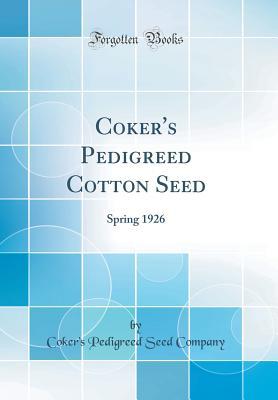Read Coker's Pedigreed Cotton Seed: Spring 1926 (Classic Reprint) - Coker's Pedigreed Seed Company file in PDF
Related searches:
Coker's pedigreed cotton seed : Spring 1926 / Pedigreed Seed
Coker's Pedigreed Cotton Seed: Spring 1926 (Classic Reprint)
Coker's pedigreed seed : spring 1926 / Coker's Pedigreed Seed
Coker\u27s pedigreed seed : spring 1926 / - CORE
1-16 of 724 results for cotton seeds utopiaseeds cotton candy pumpkin seeds - medium sized white pumpkin - 15 seeds.
We have genetically modified the fatty acid composition of cottonseed oil using the recently cotton cv coker 315 was transformed with gene-silencing constructs consisting of the plainview, ny: cold spring harbor laboratory press;.
Coker began the first successful commercial cotton improvement program in the united states based on scientific plant breeding. Subsequently, he founded coker's pedigreed seed company, and through this organization extended his efforts with equal success to include most of the principal south- ern field crops.
Coker’s pedigreed seed company was formally organized in 1913 to manage these plant-breeding operations, with david coker as president. The company, which became a major regional seed house, developed improved types of cotton, corn, oats, tobacco, melons, and other crops that helped revitalize and change twentieth-century southern agriculture.
Subsequently, he founded coker's pedigreed seed company, and through this organization extended his efforts with equal success to include most of the principal southern field crops. In this undertaking, his close associate was george james wilds, dedicated plant breeder.
Coker sought to develop a long staple cotton with high yield, large bolls (seed pods), and the ability to grow throughout the southern cotton belt, using the plant-to-row method to isolate plants with fixed characteristics that would appear in each generation of plant.
Coker's pedigreed cotton seed, spring 1931� we announce an outstanding new variety, a cotton without a name� title variants.
Coker established the coker pedigreed seed company in 1913 to formally manage his plant-breeding operations. To illustrate its emphasis on high quality, the company’s trademark used a red heart with the words “blood will tell.
The cotton in 1966 coker's pedigreed seed farms moved to lubbock.
Your stoneville cotton could land you more than just great yields this year. When you plant 100% stoneville cotton seed on a minimum of 20 acres, and rank in the top 10% of yields submitted for your state, you’ll make the stoneville legacy club.
The focus was on cotton, but coker expanded the project to include corn, oats, rye, peas, and sorghum. Coker and company, pedigreed seed company was incorporated in 1918 as a separate business with headquarters in hartsville. The company name officially became coker’s pedigreed seed company in 1923.
Department of agriculture, national agricultural library, dpla.
Mid-season coker 310: a moderately early variety with small bolls.
Under his direction, coker pedigreed seed became a leader in the breeding of seed varieties for the south's major crops. He was active in a wide variety of local, state and national farm organizations, paying particular attention to the promotion of cotton and the eradication of the boll weevil.
The company developed and improved seeds for various crops such as cotton, corn, beans, melons and tobacco.
Coker, another son of james lide coker, developed a long-staple, high-yield cotton that he marketed as “coker’s pedigreed seed,” then created coker’s pedigreed seed company. Coker experimental farms, the site of david coker’s agricultural experiments, was named a national historic landmark in 1964.
Although sherman's army had left no work stock, major coker had cotton seed and seed corn, which he planted with the use of an old mule and a pair of oxen borrowed from an uncle. He planted 60 acres (240,000 m 2 ) of cotton and 40 acres (160,000 m 2 ) of corn, which yielded 25 bales of cotton and 300 bushels of corn.
The coker pedigreed company was an outgrowth of coker’s lifelong interest in breeding strains of upland long-staple cotton. It employed a staff of experts to develop new varieties of cotton and other plants, to test new agricultural methods, and to sell the resulting seed to farmers throughout the cotton belt.
Coker’s pedigreed seed company had a lasting impact on the region. By the 1960s the company had established seed-breeding operations in several states and mexico. The company provided seeds for the majority of southeastern farms growing cotton, oats, and flue-cured tobacco.

Post Your Comments: